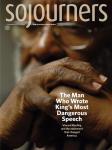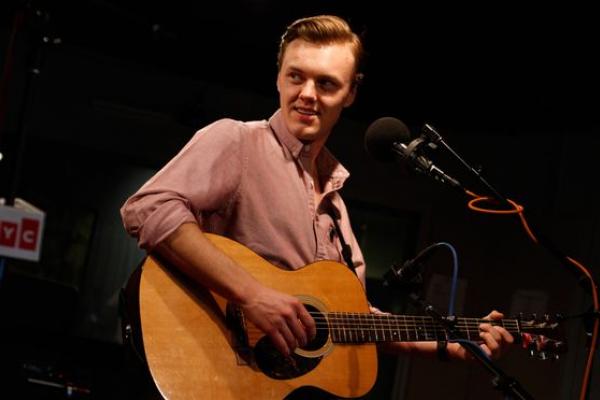INSIDE TOWN HALL, New York’s legendary concert venue, the dusty twang of a harmonica slices through the low din of the crowd filling the 1,500-seat auditorium. Most are likely here for the headliner, singer-songwriter Patty Griffin, who will take the stage after this, a performance by her opening act, Parker Millsap.
The bluesy riffs from Millsap’s harmonica are intense, long and wailing, before fading into the slow, dirty licks of a slide guitar. Then a voice, old and soulful, throbs through the room, crying out the first line of the old gospel standard “You Gotta Move” and shocking many in the audience, residents of a city where very little is shocking. You can see the wave of surprise move like a serpent across the room, with people turning to their companions, eyebrows raised and a whisper on their lips.
It’s the age that gets them—the man standing at center stage, flanked by two bandmates and looking like a rockabilly idol, with his gelled quiff and rolled-up shirt sleeves, isn’t the 60-year-old blues singer he sounds like. No, he is baby-faced, young—barely even 21—and yet he’s pulling this song from some secret, battered place inside him that’s far older than his years, and matching it with a sensual intensity that sizzles in the audience. By the time Millsap allows the last note from his weathered voice to fade, he has commanded the undivided attention of one of the world’s toughest crowds.
And they are raring for more.
Such a reception is not a surprise for this newcomer on the Americana music scene, whose self-titled album was released to critical buzz in February 2014. Since the album’s release, Millsap has played on the same bill as artists including Griffin, Jason Isbell, and Old Crow Medicine Show; nabbed a nomination for Emerging Act of the Year from the Americana Music Association; and counted Rosanne Cash as one of his admirers.
Rooted in country, rock, and blues—and seasoned with a bit of fire and brimstone—Parker Millsap is a storyteller’s album, with scenes from Sunday mornings and Saturday nights, and a cast of characters that includes a Bible-selling trucker and a parking-lot prostitute (“Truck Stop Gospel”), meth cookers (“Quite Contrary”), and a man who’s trying to live right but finds his salvation questioned (“When I Leave”). Millsap says the basis of these stories and characters is the place he was born and raised—and where he still insists on living: rural Oklahoma.
“When there’s not a lot to do, you can find something you really want to do [and] just run with it,” he explains of growing up in Purcell, population 5,952, in a conversation earlier in the day over coffee in Bryant Park. “I think there’s just a tradition of boredom that breeds art, because what people do when they’re bored is make things.” For Millsap, that came at age 5 with his first music composition, a song written for his kindergarten sweetheart.
Significantly, that was also the same year that his parents joined a Pentecostal church. “I remember the day that I came in the kitchen and all of the wine coolers and the beer and alcohol were all on the table. I still hadn’t made the connection of what they all were, but I remember seeing them and asking my mom, ‘What are you guys doing?’ and she [was] like, ‘We’re getting rid of all of the alcohol in the house.’”
Although they adopted much of the legalism of their new faith, Millsap says his parents chose to overlook one widely accepted rule in such conservative churches—banning secular music. At church on Sundays and Wednesdays, he heard fast and loud Pentecostal hymns played on piano, guitar, organ, drums, and tambourine; at home he was exposed to John Hiatt, Taj Mahal, and Ry Cooder. “Getting all of those types of music was good because—intellectually I didn’t put this together until later—but I think early on I realized they were all connected in a very real way ... [that] it all comes from the same place within.”
By the time he was 9, Millsap was learning guitar, taking lessons and sitting next to the guitar player at church, “watching his hands,” before starting to play during services himself. At 14 he joined a blues-rock band with his friend Michael Rose—who plays bass for him now—covering songs by Jimi Hendrix and the Red Hot Chili Peppers. But Millsap wasn’t satisfied, and soon he began trying his hand at originals, a process that coincided with his beginning to question the strict conservative doctrine that he heard preached three times a week and had taken “all to heart ... as deep as I could.”
It all started on a mission trip to Utah to convert Mormons. “We had [a] flight, and so I went to the library,” he recalls. “I was going through the books and saw a [Kurt] Vonnegut cover and said, ‘Ah, that looks interesting,’ and I was on the plane headed to this mission trip reading Vonnegut.”
Millsap gets tickled at the absurdity of reading Breakfast of Champions and preparing to proselytize. “Cognitive dissonance was in full effect, because I started understanding what [Vonnegut] was saying [about thinking for yourself]. By the time I got through the book, my perspective shifted: ‘Oh, there’s this whole other side of everything that I’m not seeing.’”
And then he read a novel that was a bit closer to home—John Steinbeck’s The Grapes of Wrath, about a poor family forced to leave Oklahoma during the Dust Bowl. “It kind of all came to a head,” he says of his separating from fundamentalism and pursuing his vocation. Instead of going to college, he interned for a few months at a recording studio in California, wrapping equipment cables, making coffee, and watching—just like he had in church—an engineer who had recorded Tom Waits. He returned to Oklahoma with some experience, living over his parents’ garage, working for his aunt to have gas money, writing lots of songs, and beginning to play live in bars and clubs.
Like Steinbeck, he found he didn’t have to look that far for material, discovering his songs were immersed in the themes of sin and redemption that he had heard his whole life and had created what he refers to as a “guilty conscience ... I will never get over.”
“A lot of the characters [in my songs] are like little bits and pieces of different people that I’ve met and know, and [I] just stack them up,” he explains. “None of them are about this specific person ... but they are pieces [that] I kind of conglomerate into this character.”
Millsap writes from a place of no judgment, a technique that allows for a complex narrative to develop about rural life, one in which a man can pin all his hopes on a lottery ticket, as in the heartbreaking “Yosemite”; in which a man can turn his back on his small town in “Disappear”; and in which a sinner confesses to his “shadows in hiding” in the poignant “Forgive Me.”
His songs, Millsap confesses, often leave people guessing about his intentions toward the brand of religion with which he grew up—a fact he relishes. “I love it. I’m just telling a story. It’s up to you to figure out. There are definitely parts ... that were written from a more sincere point of view, and there are other parts [that] I tweaked ... to be a little bit outlandish.” If he has a message, he says, it’s one that hearkens back to Steinbeck’s portrayal of rural America: “These ‘little’ people are not so little. They’re these little people working these miniscule jobs, [but] their lives are just as important as yours.”
Like the rest of Millsap’s rapidly expanding fan base, the audience at Town Hall gets this message loud and clear. They listen in rapt attention as he croons “The Villain,” a tender ballad about refusing to be the bad guy in a relationship. They cheer him wildly for his newly written song “Heaven Sent,” told from the perspective of a gay son writing a coming-out letter to his conservative preacher father. And when he sings his closer, the rollicking “Truck Stop Gospel,” throwing his voice up to the roof, they give him a standing ovation so loud it sounds like it could be heard all the way back home in Oklahoma.

Got something to say about what you're reading? We value your feedback!
